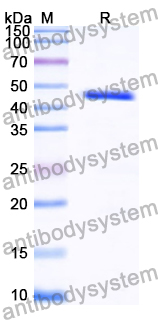Catalog No.
YHB40101
Expression system
E. coli
Species
Homo sapiens (Human)
Protein length
Met1-Lys403
Predicted molecular weight
48.18 kDa
Nature
Recombinant
Endotoxin level
Please contact with the lab for this information.
Purity
>90% as determined by SDS-PAGE.
Accession
O76054
Applications
ELISA, Immunogen, SDS-PAGE, WB, Bioactivity testing in progress
Form
Lyophilized
Storage buffer
Lyophilized from a solution in PBS pH 7.4, 0.02% NLS, 1mM EDTA, 4% Trehalose, 1% Mannitol.
Reconstitution
Reconstitute in sterile water for a stock solution. A copy of datasheet will be provided with the products, please refer to it for details.
Shipping
In general, proteins are provided as lyophilized powder/frozen liquid. They are shipped out with dry ice/blue ice unless customers require otherwise.
Stability and Storage
Use a manual defrost freezer and avoid repeated freeze thaw cycles. Store at 2 to 8°C for frequent use. Store at -20 to -80°C for twelve months from the date of receipt.
Alternative Names
SEC14L2, Supernatant protein factor, C22orf6, Squalene transfer protein, KIAA1658, hTAP, TAP, KIAA1186, SPF, Alpha-tocopherol-associated protein, SEC14-like protein 2
SEC14L2 regulates the transport of cholesterol in non-small cell lung cancer through SCARB1., PMID:39696431
Increased SEC14L2 expression is associated with clinicopathological features and worse prognosis in oral squamous cell carcinoma., PMID:38575815
Stimulating T cell responses against patient-derived breast cancer cells with neoantigen peptide-loaded peripheral blood mononuclear cells., PMID:38349410
Arf1-PI4KIIIβ positive vesicles regulate PI(3)P signaling to facilitate lysosomal tubule fission., PMID:37289133
Comprehensive analysis of cuproptosis-related genes and tumor microenvironment infiltration characterization in breast cancer., PMID:36341328
Identification of hub genes in AR-induced tamoxifen resistance in breast cancer based on weighted gene co-expression network analysis., PMID:36334189
Circuit-wide proteomics profiling reveals brain region-specific protein signatures in the male WKY rats with endogenous depression., PMID:36162674
Identification of SEC14 like lipid binding 2(SEC14L2) sequence and expression profiles in the Chinese tree shrew (Tupaia belangeri chinensis)., PMID:35767108
A Hepatitis C virus genotype 1b post-transplant isolate with high replication efficiency in cell culture and its adaptation to infectious virus production in vitro and in vivo., PMID:35763545
A Golgi-derived vesicle potentiates PtdIns4P to PtdIns3P conversion for endosome fission., PMID:34183801
Construction of a Myc-associated ceRNA network reveals a prognostic signature in hepatocellular carcinoma., PMID:34141458
Proteome-wide analysis of protein alterations in response to aristolochic acids in rat kidney and liver tissues., PMID:34008672
Analysis of expression of vitamin E-binding proteins in H2O2 induced SK-N-SH neuronal cells supplemented with α-tocopherol and tocotrienol-rich fraction., PMID:33232330
Genome-wide DNA Methylation Profiling of Blood from Monozygotic Twins Discordant for Myocardial Infarction., PMID:31882500
Comparative study on the replication of HCV1b genome between wild-type and cell culture-adaptive mutant in regard to sensitivities against anti-HCV drugs., PMID:31854467
Discovering master regulators in hepatocellular carcinoma: one novel MR, SEC14L2 inhibits cancer cells., PMID:31851620
Sputum biomarkers during aspirin desensitization in nonsteroidal anti-inflammatory drugs exacerbated respiratory disease., PMID:31128610
Sec14l3 potentiates VEGFR2 signaling to regulate zebrafish vasculogenesis., PMID:30962435
SEC14L2, a lipid-binding protein, regulates HCV replication in culture with inter- and intra-genotype variations., PMID:30472319
Changes in the expression of α-tocopherol-related genes in liver and mammary gland biopsy specimens of peripartum dairy cows., PMID:29605316
Identification of nucleotides in the 5'UTR and amino acids substitutions that are essential for the infectivity of 5'UTR-NS5A recombinant of hepatitis C virus genotype 1b (strain Con1)., PMID:29549787
Manipulation of both virus- and cell-specific factors is required for robust transient replication of a hepatitis C virus genotype 3a sub-genomic replicon., PMID:28984238
The Sec14-like phosphatidylinositol transfer proteins Sec14l3/SEC14L2 act as GTPase proteins to mediate Wnt/Ca2+ signaling., PMID:28463110
α-Tocopheryl Phosphate Induces VEGF Expression via CD36/PI3Kγ in THP-1 Monocytes., PMID:28059487
Hepatitis C virus's next top models?, PMID:27571762
A robust model of natural hepatitis C infection using hepatocyte-like cells derived from human induced pluripotent stem cells as a long-term host., PMID:27044429
Modulation of Signal Transduction and Gene Expression by Vitamin E via PI3Kγ/PKB and hTAP1/SEC14L2-Mediated Lipid Exchange., PMID:26598896
Viral hepatitis: A new HCV cell culture model for the next clinical challenges., PMID:26441247
SEC14L2 enables pan-genotype HCV replication in cell culture., PMID:26266980
An N-terminal Amphipathic Helix Binds Phosphoinositides and Enhances Kalirin Sec14 Domain-mediated Membrane Interactions., PMID:25861993
Induction of VEGF expression by alpha-tocopherol and alpha-tocopheryl phosphate via PI3Kγ/PKB and hTAP1/SEC14L2-mediated lipid exchange., PMID:25290554
Modulation of phosphorylation of tocopherol and phosphatidylinositol by hTAP1/SEC14L2-mediated lipid exchange., PMID:24983950
Antioxidant and vitamin E transport genes and risk of high-grade prostate cancer and prostate cancer recurrence., PMID:24038157
The effects of platelet gel-released supernatant on human fibroblasts., PMID:23438188
Alteration of α-tocopherol-associated protein (TAP) expression in human breast epithelial cells during breast cancer development., PMID:23411208
Effects of polymorphisms in vitamin E-, vitamin C-, and glutathione peroxidase-related genes on serum biomarkers and associations with glaucoma., PMID:23401652
Antipathogenic properties of Lactobacillus plantarum on Pseudomonas aeruginosa: the potential use of its supernatants in the treatment of infected chronic wounds., PMID:22642376
Proteomic portrait of human breast cancer progression identifies novel prognostic markers., PMID:22414580
Gene expression profiling reveals new aspects of PIK3CA mutation in ERalpha-positive breast cancer: major implication of the Wnt signaling pathway., PMID:21209903
Alternative splicing and gene polymorphism of the human TAP3/SEC14L4 gene., PMID:20012369
Reduced expression of tocopherol-associated protein (TAP/Sec14L2) in human breast cancer., PMID:19909011
[Anticancer mechanisms of vitamin E succinate]., PMID:19799824
Comment re: Vitamin E transport gene variants and prostate cancer., PMID:19654307
Dual expression of alpha-tocopherol-associated protein and estrogen receptor in normal/benign human breast luminal cells and the downregulation of alpha-tocopherol-associated protein in estrogen-receptor-positive breast carcinomas., PMID:19305383
Association of variants in two vitamin e transport genes with circulating vitamin e concentrations and prostate cancer risk., PMID:19190344
Characterization of three human sec14p-like proteins: alpha-tocopherol transport activity and expression pattern in tissues., PMID:18725265
Reduced expression of alpha-tocopherol-associated protein is associated with tumor cell proliferation and the increased risk of prostate cancer recurrence., PMID:17334589
SEC14-like protein 1 interacts with cholinergic transporters., PMID:17092608
Tocopherol-associated protein-1 accelerates apoptosis induced by alpha-tocopheryl succinate in mesothelioma cells., PMID:16579965
Tocopherol-associated protein suppresses prostate cancer cell growth by inhibition of the phosphoinositide 3-kinase pathway., PMID:16267002

